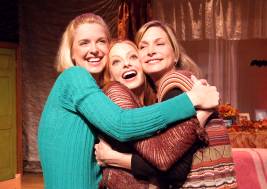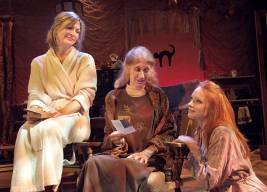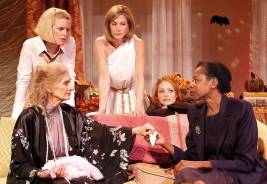RECOMMENDED
A patriarch’s death brings his three adult daughters back to the family homestead in northern Georgia. Compounding their grief is the upsetting discovery that their mother waited eight full days to inform them of their father’s demise. What on earth could have provoked her to sit on this vital piece of family news for so long? Has Mom gone and lost her mind?
These are the questions that Charlene, Bailey, and Lena attempt to unravel in Lulu’s Last Stand, currently in its World Premiere engagement at Beverly Hills’ Theatre 40. Though it’s not until its second act that Veronica DiPippo’s dramedy really kicks into gear, prompting this reviewer to recommend some first act cuts, it ends up being an enjoyable and even inspiring look at an odd-ball mother and her three very distinctive daughters.
It’s been over a week since eccentric widow Abby (Irene Roseen) lost her husband of forty-three years, but she’s still carrying on lengthy conversations with him (and with us) from the porch of their Halloween decoration-festooned Georgia lake house. She recalls a childhood spent alternately creating chalk drawings on sidewalks, dreaming of a future as an artist, and wishing she were the character Lulu in 1920s film star Louise Brooks’ silent flick Pandora’s Box. A whirlwind romance with George ended those dreams, and only his demise some four decades later has brought them back to the forefront of Abby’s thoughts.
There’s also the matter of how to dispose of his ashes, though that concern is quickly resolved when Abby discovers a hole in the paper box containing George’s earthly remains and realizes that her husband has been underfoot all week, some of him flushed down the toilet, other bits swept under carpets.
It’s about this point that Abby’s daughters begin to arrive. First home is middle child Bailey (Christine Joëlle), an uptight, high-power lawyer in the midst of a breakup with husband number three, whose phone calls (and other work-related ones) keep the attorney’s cell phone ringing insistently. Even Bailey’s practiced skills as an interrogator can’t coax from Mom the reason she waited so long to let her daughters know of their father’s death, Abby much preferring to go on and on about her latest passion, Buddhist chanting. (She’s turned one daughter’s bedroom into a yoga room, another into a chanting room, and the third? Well, it’s still “sort of intact.”)
Charlene (Julie Lancaster) shows up next. A recently divorced teacher with a big heart and two teenage sons, Charlene’s lifelong rivalry with Bailey reveals itself in her distaste for younger sis’s decision to defend a line backer who raped and nearly murdered a young girl. (“Here’s my sister again, defending the indefensible,” she complains.) Charlene too is dissatisfied with her mother’s vague insistence that she “needed to … adjust to some things” before getting around to contacting her daughters.
Neither daughter is happy when Abby shows them their dad’s brief will, written in indelible marker on the underside of two of the living room sofa cushions, which—after leaving everything to his widow—asks his family to forgo any memorial service and “just charbroil me good and dump me in the lake.”
Youngest sis Lena (Elizabeth J. Carlisle) is the last to arrive, soaking wet and wrapped only in a boat cover, having decided on a late October swim after being dropped off by “the cutest cab driver. Abdul-Mujib. Means ‘Servant of the Responder.’ I’d sure like to respond to him alright.” The kooky thespian is clearly the family free spirit, though an upcoming appearance in a major Hollywood movie does bode well for her acting career.
Abby’s cryptic behavior becomes even harder for her daughters to fathom when she reveals that she’s given their family home away…to be turned into a battered women’s shelter.
Despite her daughters’ pleas, and following considerable speculation about what could be prompting Mom’s bizarre conduct (could it be encroaching senility?), the truth finally emerges, a recently discovered fact about their father’s life which rocks the three sisters’ carefully tended world to the core.
Press materials for Lulu’s Last Stand give away far too much by revealing writer-director DiPippo’s motivation for writing this final entry in her “Women’s Trilogy.” It’s best to know nothing more than has been revealed thus far in this review so as not to have the surprise in Abby’s end-of-Act One revelation spoiled.
In any case, an hour into Lulu’s Last Stand is too long a wait for the fireworks provoked by this news to get started. Judicious cutting, perhaps even reducing the play to a ninety-minute one act, would propel us more quickly into the nitty-gritty of Act Two, and the eleventh hour appearance of a fifth character who really sets things ablaze. A little of Abby’s Southern sugar and molasses goes a long, long way indeed, and it’s the play’s more acerbic characters (Bailey and Charlene in particular) who end up commanding the greatest interest.
Not surprisingly, it’s Theatre 40 regulars Joëlle and Lancaster whose performances really get Lulu’s Last Stand a-sizzlin’, the former absolutely spot-on as a high-strung, control freak of an attorney whose middle name could be Baracuda, with the marvelous Lancaster matching Joëlle every step of the way as her more people-oriented sister. Carlisle has fun with nonconformist Lena, but has her best moments when Lena is at her most down-to-earth. Roseen too shines brightest in the second act, once Abby has gotten over her meditation-induced languor (and those cutesy conversations with dear departed George) and starts showing signs of feisty life, particularly when a heartbreakingly real Valeri Ross (in the role of Margaret) arrives to stir things up and deliver the play’s most powerful moments.
Set designer Meghan C. Wunch has created a lovely rustic lake house whose walls seem to be constructed of loose-hanging thread or yarn, I’m not really sure why. Lighting designer Kathi O’Donohue illuminates the stage with a rainbow of warm autumn hues, situating us smack dab in the middle of a Georgia fall, and later adds some gorgeous night sky effects. Film composer Mark Aramian’s sound design and original music do much to enhance the play’s moods, including those frequent interruptions by Bailey’s cell phone and some very realistic car sounds. Danielle Domingue’s costumes have been carefully chosen to fit each character’s personality, from Bailey’s all-business pant suits to Abby’s aging hippy wear. Marianne C. Wunch is stage manager, Evan Pavlica assistant stage manager. (The latter’s onstage assistance during scene changes does come across a tad intrusive amongst a deliberately all-female cast.)
As it stands now, Lulu’s Last Stand seems like a work still in progress, but a promising one. It’s enjoyable spending time with three such different sisters and seeing how this family reunion changes them, and how it brings them closer to their mother and better able to see her with grown-up eyes. It’s also inspiring to see a 70something woman empowered by life events to start afresh. The women of Abby’s age in last night’s audience could be heard raving as they left the theater, and that’s a high recommendation indeed.
Theatre 40, 241 S. Moreno Dr., Beverly Hills.
www.Theatre40.org
–Steven Stanley
November 3, 2010
Photos: Ed Krieger





 Since 2007, Steven Stanley's StageSceneLA.com has spotlighted the best in Southern California theater via reviews, interviews, and its annual StageSceneLA Scenies.
Since 2007, Steven Stanley's StageSceneLA.com has spotlighted the best in Southern California theater via reviews, interviews, and its annual StageSceneLA Scenies.







 COPYRIGHT 2024 STEVEN STANLEY :: DESIGN BY
COPYRIGHT 2024 STEVEN STANLEY :: DESIGN BY